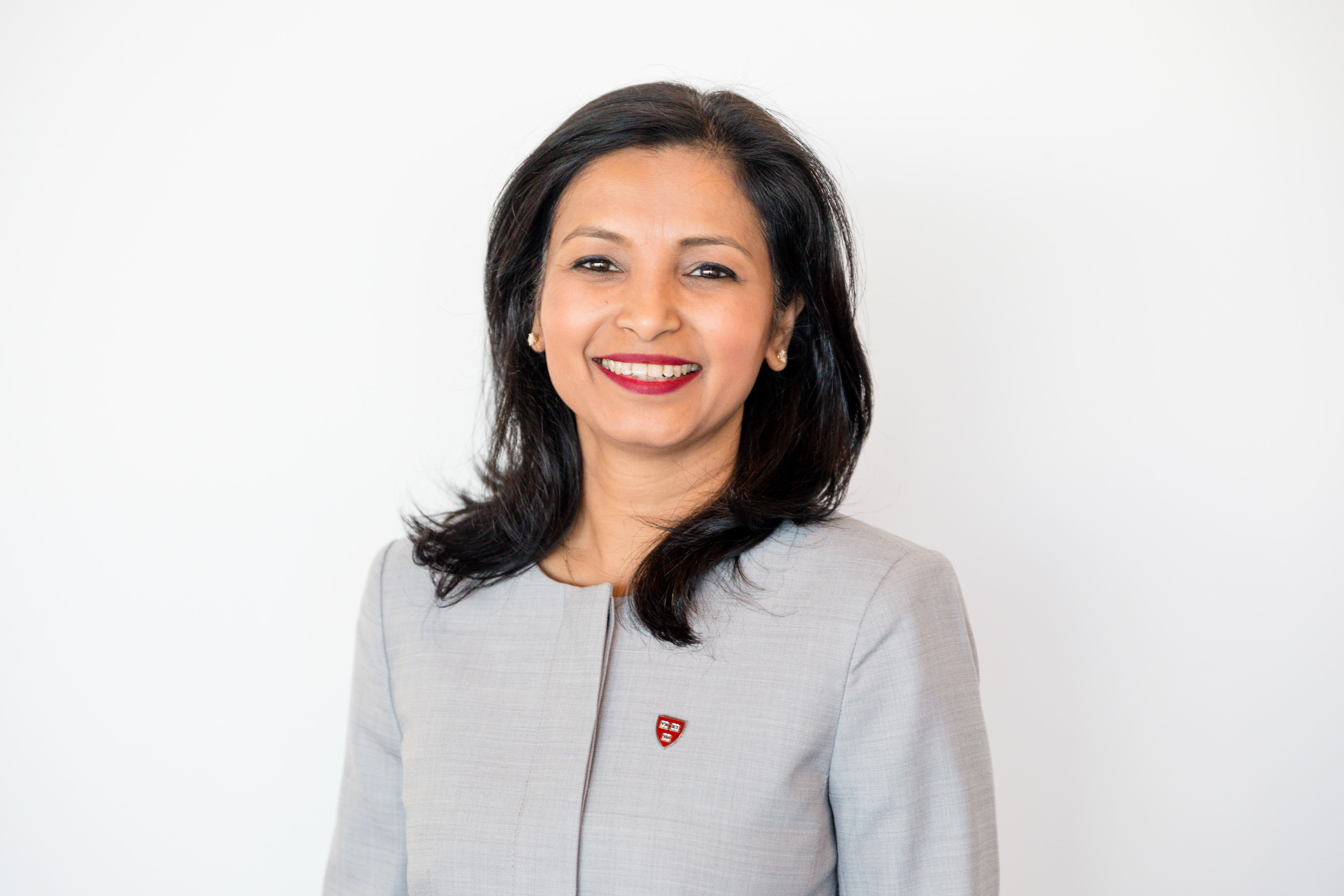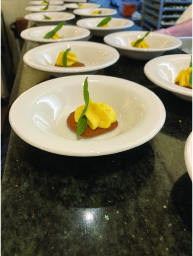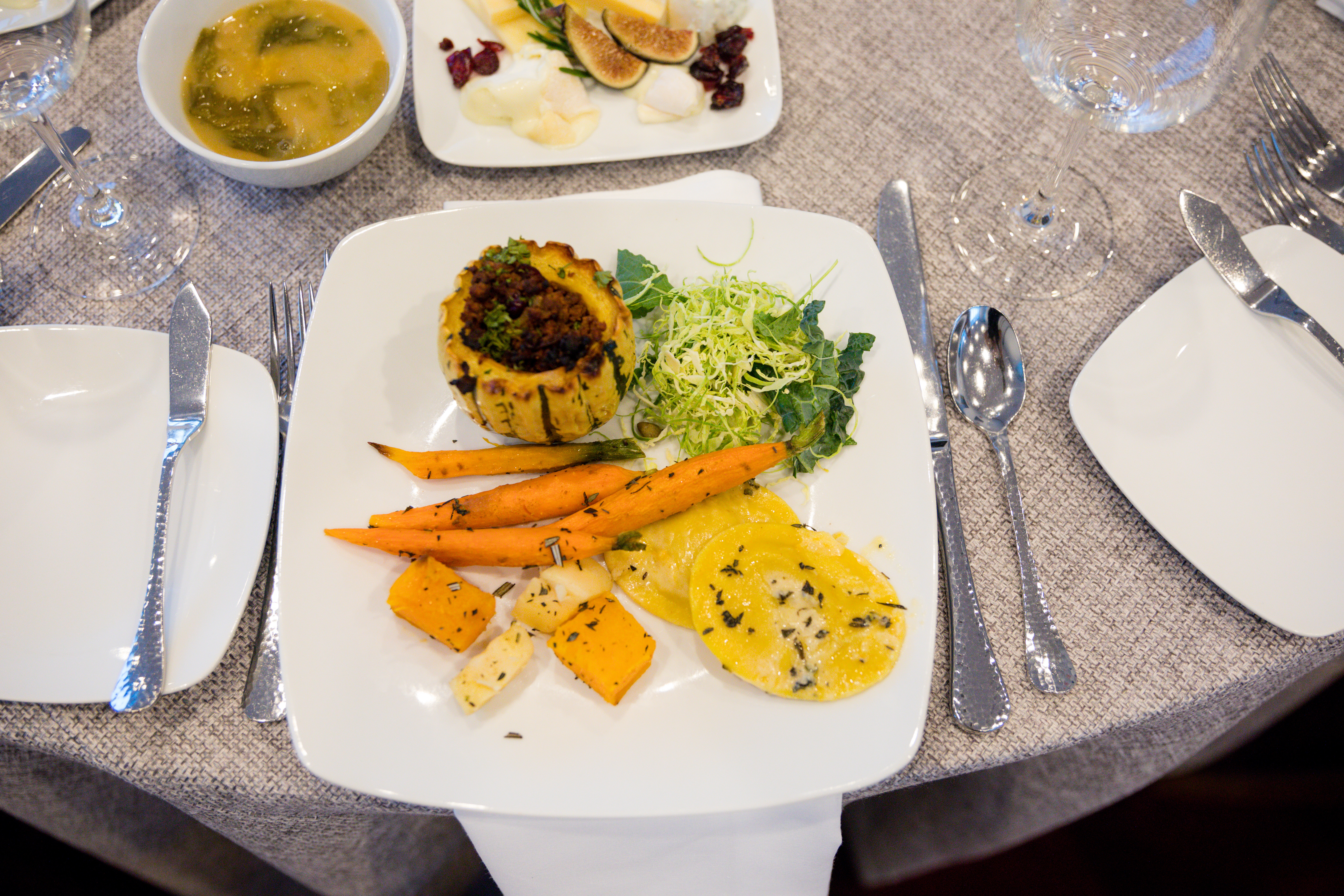Since joining Harvard as the Managing Director for Harvard University Dining Services on April 6, I have been taking every opportunity to explore campus and to meet everyone I can with an interest in food – from our wonderful students to our dedicated staff to our thought and community partners throughout every program and school.
From the Managing Director's Plate
Strategic Vision Revitalizes Harvard University Dining Services
Upon her arrival on campus in April 2021 as Managing Director of the oldest collegiate foodservice in the country, Smitha Haneef laid out a clear vision and priorities for transforming Harvard University Dining Services' (HUDS) hospitality experience. What began as a series of listening and learning sessions across all the University’s constituencies grew into a series of pilots played out over the 2021-22 school year. In the fall of 2022, HUDS launched a robust plan for an equitable, diverse, nutritious, climate friendly and delicious hospitality and dining program.
“I spent a lot of time initially just hearing from our community,” says Haneef, who previously led hospitality at Princeton. “I took every meeting I was offered, tasted practically every dish we made, and really studied the culture of Harvard that was developing as we emerged from COVID.”
The result was an ambitious and detailed Strategic Vision that Haneef launched on arrival with 7 focus areas, which she refined to five after her learning tour:
- Student/Community Engagement & Advocacy – listen, learn and act as a living lab developing solutions in partnership with our community
- Food & Agriculture – connect with faculty and students interested in curricular and co-curricular food systems experiences
- Diversity & Inclusion – celebrate through food and culture, team and people
- Food Systems, Climate Change, Health & Environmental Impact – collaborate with leaders from Schools to drive change
- Operations Strategy, Innovation, Quality Assurance & Safety – lead with emphasis on effectiveness and efficiency of resources, and prioritize safety, compliance and risk mitigation in all directions
HUDS’ Residential Dining operations for the undergraduates of Harvard College returned to full density and full service in the fall of 2022 by first prioritizing its team and people. A focus on hiring allowed HUDS to either promote or bring on board more than 50 team members across its operations. This effort included offering a first-time training for existing team members who wanted to advance into new culinary positions, or to grow in kitchen leadership and responsibility. Approximately 20 team members participated in multi-week culinary training that has empowered them grow with the department.
“We’re back at full power,” says Haneef, “and we’re squarely focused on one of my particular passions, which is right-skilling and up-skilling our team.” These efforts extend to continued training in occupational health and safety topics, allergen management protocols, and supporting religious and dietary needs. “We’ve forged great strategic partnerships with our Chief Diversity Officer and Office for Diversity, Equity, Inclusion and Belonging, as well as with spiritual leaders such as our campus Rabbi and Muslim Chaplains,” says Haneef. “We have been able to make all our services more inclusive for those communities in a way that makes me very proud.”
HUDS began the year in Residential Dining with several menu refinements, synthesized from student, faculty, management and culinary team inputs by Martin Breslin, Director for Culinary Operations:
- The salad bar received a makeover to make it a more complete, nutritious meal destination, becoming Greens & Grains with weekly suggested bowl constructions, such as the Big Apple or the Sesame Ginger Salmon.
- The lunchtime deli bar has greater variety, with ingredients for vegetarian and meat-based personally crafted sandwiches (such as Mesquite Tofu and Guacamole or Toasted Cage Free Egg Salad with Pickle Chips and Tomato) and an option for students to make a panini with the nearby panini press.
- At lunchtime a daily chef-crafted, biodiverse, small-bite fruit or vegetable dish, called Delish!, allows the culinary team to showcase their skills and our local bounty. Dishes have included a fennel salad with wild Maine blueberries, roasted brussels sprouts with miso soy, sesame and chili flakes, or Latin-spiced fried green tomatoes with salsa fresca.
- Global Bistro Bowls are available on Thursdays, offering a restaurant-style dish that weekly celebrates a different world cuisine, be it a French bouillabaisse, a Caribbean Sancocho, or an Ethiopian Doro or Misir Wat.
- Dessert got an upgrade on weeknights to feature a sweet treat centered on fruit, giving students a chance to tailor the level of their indulgence.
HUDS supports students with special dietary needs to ensure that they can enjoy full participation in the community fostered through the undergraduate hospitality experience. Campus Dietitian Karen Jew creates individualized plans based on each student’s unique needs, and ensures access to a healthy, inclusive experience.
In addition to the regular seasonal cycle menu, HUDS also laid out events for each month that allow us to engage with and celebrate our diverse community through food. LatinX heritage month featured chef-inspired arepas, ceviche, street tacos and enchiladas. During World Food Day, HUDS partnered with the Center for African Studies to bring forward students’ personal, plant-based recipes, like Bariis Iskukaris (Somali Rice).
After Diwali, students celebrated. “Diwali dinner was SO GOOD today! can it be Diwali dinner every week?! Haha. Thank you all so much!” Another noted, “The Diwali dinner was EXCELLENT. Truly, I cannot begin to express my delight as an Indian American senior to be recognized in this way.”
For Native American Heritage Month, chefs are doing a combination of student-shared recipes, such as Nassaump from a Wampanoag student or Corn Soup from an Akwesasne Mohawk tribe member, versus a chef-discovered Venison Stew from the Ojibwe people or a Three Sisters Stew from the Chickesaw.
“I am celebrating the energy and creativity of our team,” says Haneef, “as we emerge from COVID, we take on an ambitious vision for change, and we establish new ways of connecting to our community.”
This fall also represents a return to full service in the professional school hospitality venues and campus cafes, each of which have a unique food and beverage programs tailored to the communities in which they are embedded and working to foster hospitality. Kim Smith & Laurie Torf, Associate Directors for Retail Operations, have been systematically re-staffing, re-opening and reinvigorating the spaces.
“Every café has its own personality,” Haneef says, “and I love to watch it emerge.”
“In the student-managed venues, we’re starting from scratch,” notes Smith, “since most of the students who previously managed or even worked in these spaces have graduated. The best part of my job is the opportunity I have to help our students gain the business acumen they need to run an operation, and then watching them grow in confidence.” Once they master the operations themselves, Smith then supports the students as they make the spaces their own, including suggesting menu offerings, hosting events and activities, and setting the “vibe” for each space.
In 2020 and 2021, HUDS extended its professional hospitality expertise to the Harvard Law School (HLS), the Harvard Divinity School (HDS) and the Science & Engineering Complex (SEC).
The Harvard Law School launched under the specter of COVID restrictions, but today is at full operation, including daily catering for dozens of events plus two cafes, a coffee bar and a pub. At the peak of service, HLS has three operations open simultaneously to support a very intense community with a nutritious, fresh array of choices that also support numerous dietary needs, including kosher, halal, or the student government supported Plant Positive focus.
“I love working with produce from farms where we have long-standing, mutually supportive relationships,” says Andrew Urbanetti, Executive Chef for HLS. “I love knowing the farmer who grew the native blue hubbard squash that I’m then turning into a soup.” Urbanetti, along with the rest of the department, marked World Food Day with dishes that celebrate the season and the food system at large. (Recipe, photo)
With operations at the Harvard T. H Chan School of Public Health (SPH) in Boston’s hospital district, the Science & Engineering Complex (SEC) in the burgeoning Allston campus, the Harvard Kennedy School (HKS) at the heart of Harvard Square, and the Harvard Divinity School (HDS) Café on the northwest campus, the team manages diverse demands. SPH regularly operationalizes the latest guidance from the school’s Department of Nutrition. SEC models the campus’ sustainability ethos in its newest “living” building. HKS regularly hosts world leaders and dialogues driving global policy with menus that embody the health, nutrition and climate goals they espouse. And at HDS, they model our diversity of culture and spiritualty through food.
“These venues are wildly different,” notes Torf, “but it’s so exciting to see them bustling with activity, and with amazing food.” For example, Chef Robert Torino at SEC celebrated LatinX Heritage Month with a series of specials throughout September, and in October helped the University celebrate several sustainable building awards with locally-sourced, entirely plant-based catered functions.
For HUDS’ on-premise catering group, Crimson Catering, the Vision kicked off with a Commencement celebrating three class years (for the classes of 2020, 2021 and 2022), plus a full schedule of reunions. Over three weeks of activities, Crimson Catering led the service of more than 100,000 meals through 250-plus events across Harvard’s multiple Boston-area campuses. It was a feat of both logistics and team spirit, and even included HUDS’ staff leading more than 100 colleagues from other Campus Services departments who worked outside their traditional roles to execute the massive undertaking.
Under the leadership of new Director for Hospitality & Catering Kyle Ronayne, the team launched a Climate-Friendly, Seasonal menu for the Fall 2022 semester, and is using it to support a return to a full schedule of campus events that lead with nutritious choices that put locally sourced plants at the center of the plate.
“Our community is eager to resume in person gathering, and they’re letting us help them re-think menus to be more inclusive for a community that embraces climate positive choices and wants to be flexible for a broad variety of dietary needs,” says Ronayne. “Clients approach the idea with some trepidation, but I’ve gotten incredible feedback from folks whose guests applaud the move, and come back for seconds of the delicious food.”
As a progressive step in that growth, Haneef partnered with Dr. Walter Willet, a renowned nutrition expert and professor at the Harvard T. H. Chan School of Public Health, to launch the Harvard Food Systems Initiative (HFSI) this past September. Through HFSI, HUDS will create a landing place for food systems conversations on campus. “I hope to convene thought leaders from our disparate areas of study and interest to generate food systems knowledge, innovation and connection,” says Haneef. Dr. David Nabarro, who leads food systems dialogues on behalf of the United Nations, came to campus and led a Harvard-centered dialogue that included undergraduate and graduate students, University staff and faculty, and food systems partners such as farmers, fishermen and advocates. This was followed by two Distinguished Faculty Lectures and a special dinner in the dining halls featuring a climate-friendly menu.
“The conversations coming out of HFSI’s launch has already transformed how I think about the road ahead,” says Haneef. “I’m looking forward to connecting more richly and deeply with our local and regional food systems practitioners. For example, we hosted local farmers to talk about planning together for future growing seasons, and I was struck by one of our farmer colleagues who talked about listening to the land and growing crops that would best respond to and preserve the soil. These are our next steps and I’m excited for the path forward.”





